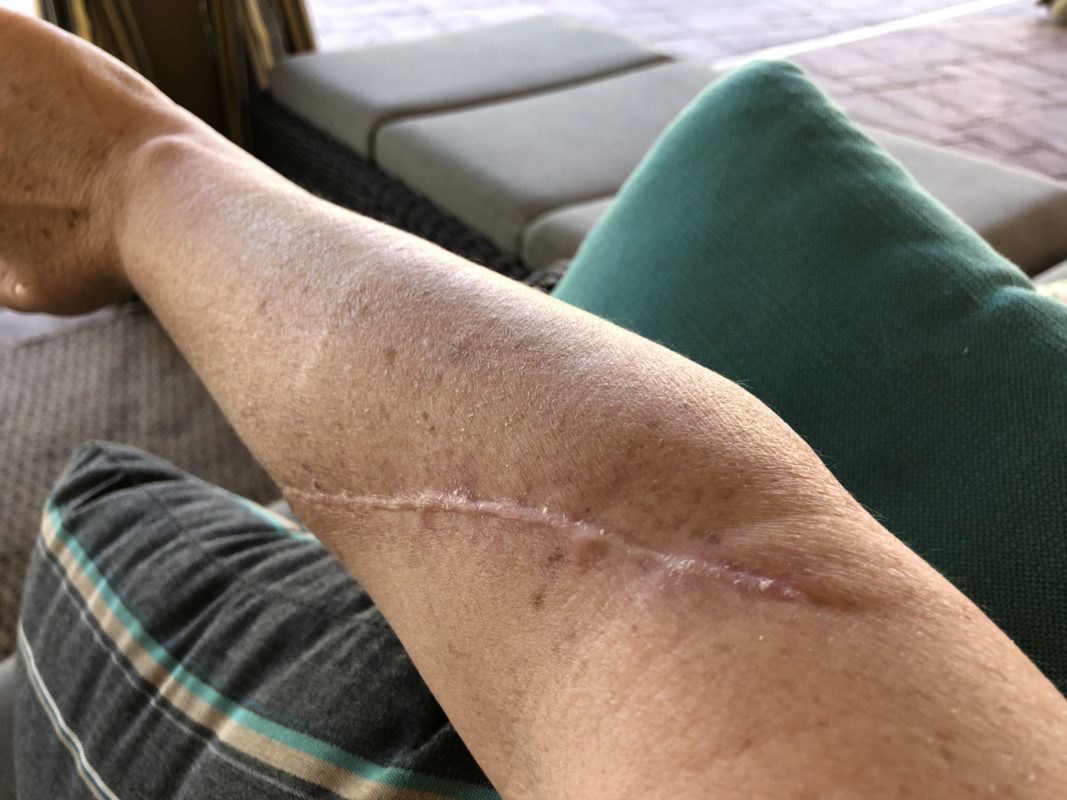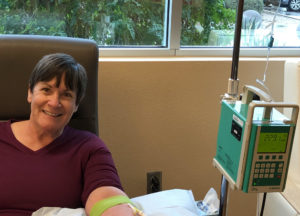Featured Survivor Story:
Physician Assistant Diagnosed with Melanoma Learns to Make Really Good Lemonade


By Vallerie A. Malkin
If anyone knows cancer, it’s physician assistant Barbara Regis. She is a 56-year-old fourth-generation health care provider who has been counseling her family practice patients with cancer for over 22 years. So when a lesion showed up on her own arm last year, she knew she should probably get to the dermatologist, but like most busy people, she put it off.

Barbara Regis, Stage III Melanoma Survivor
Barbara finally got to her dermatology physician assistant to have the new spot, as well as what she felt was a squamous cell carcinoma (SCC) on her face, biopsied and went about her business.
She still remembers the date and time of the call: It was April 3, 2018, at 12 noon, and she was with her staff sitting on a bench outside her clinic. Her dermatologist said: “I need to talk to you.”
Alarmed by the tone of her voice and by the fact that the call was coming directly from the dermatologist rather than her medical assistant, Barbara moved away from her colleagues to learn the news. “Number one, you were right,” said the doctor, confirming the lesion on her face was indeed SCC.
Then, according to Barb, there was a big pause. “Number two is this. You’ve got a rare form of melanoma and it’s aggressive and we’re really concerned for you. Let’s get you into an oncologist and a surgeon ASAP.”
Barbara responded with disbelief: “Say that again?”
She knew she had to collect her thoughts so she could see her afternoon patients, but even worse, she had to tell her husband the bad news when she got home.
Here she was on the other side of the table after having diagnosed 14-16 melanomas in her career as a health care provider. She has seen how aggressive melanoma could be and that such a diagnosis could be lethal. She had been through this journey with some patients, and she remembers a few that did not make it.
Barbara, an Arizona resident who grew up in Pennsylvania, has no family history of melanoma, nor was she a big sunbather. She and her family used to fish at the Jersey shore but she remembers wearing sunscreen most of the time. Just a year ago she and her husband, Tony, were being teased for being covered up at the pool at their vacation home in Mexico.
“I’m just trying to be careful,” she recalls telling the neighbors. “I don’t want to get skin cancer!”
Family ties and faith in medicine
Telling her father, a retired physician who is now 96, was difficult. He was the reason she went into medicine in the first place, and now she was sick.
“His response was, ‘You’re in big trouble,’” Barbara recalls. Her father’s sister had died of skin cancer, but they had never determined what type because the pathology in those days was not as specific. He suspected it might actually have been melanoma and worried he had passed on some sort of gene to his daughter. However, genetic testing revealed no such markers.
Barb told her dad: ”Treatments are better. I’m not going anywhere. I’m going to work really hard to beat this and do everything my doctors say.” She meant it.

Six months after surgery and SLNB
The lesion was removed, and her diagnosis was amelanotic nodular melanoma. Her dermatologist ordered the Castle Test, and the result suggested she had the highest risk for recurrence in the next five years.
Along with her surgical excision, Barb had a sentinel lymph node biopsy, which revealed the cancer had metastasized to lymph nodes in her axilla, and she was given a diagnosis of Stage IIIB.
She had seen patients fight and lose battles with formidable diseases. She felt lucky that she had a chance to fight. It wouldn’t be easy, but Barbara knew that in recent years there have been medical breakthroughs with different therapies and melanoma is no longer the death sentence it used to be.
“The chance of me living a full, long life is so much better than even five years ago, that I felt grateful,” says Barb.
Barbara has recently completed her 26 treatments of the immunotherapy Nivolumab (Opdivo). She has been lucky, as her side effects have been minimal. She was able to return to work full-time a week after her surgery. Even though the new protocols with Opdivo are monthly, she elected to continue her treatments every two weeks.
She was also lucky to have been diagnosed after January 1 as having Stage III, because insurance would not have approved the treatment otherwise.

Immunotherapy with Opdivo at Ironwood Cancer and Research Center
“I know deep in my heart that I would have been a walking time bomb had I not qualified for that treatment,” she says, “and that’s where I feel really blessed.”
Barbara has had 15 biopsies and all have been negative. There have been unexpected roadblocks; a false positive PET Scan, or in Barb’s case, the accidental discovery of an arachnid cyst in her brain that is a fairly good size. She has to now get an MRI every year to make sure it remains stable.
Still, Barbara feels lucky that it was discovered and knows it wouldn’t have were it not for melanoma. Now doctors can keep an eye on it.
Life does not stop for cancer
After her melanoma diagnosis, Barb was hospitalized four different times. In between treatments, she and her husband had to move her elderly parents from their independent living situation to group home, then to assisted living, where her mother became ill. Shortly after Barb moved her father back to a group home near her house, her mother died.
The family faced another tragedy in February when her brother-in-law died in an airplane crash. After 14 ½ years, Barbara lost her sidekick, an Old English Sheepdog named Abby, whom she adored and never went anywhere without.

Barbara and her husband Tony
With the help of her husband, Tony, who Barb refers to as her “rock,” she was able to keep a positive attitude and focus on getting well despite so many painful setbacks.
“You have two choices in this life,” she says, “you feel sorry for yourself or you feel grateful for what you have.”
In the process, Barb developed what she calls “survivor’s motivation”: “Getting melanoma super-charged my desire to help others,” she explains. “I want to try to make a difference.”
Staying engaged
Barb is a natural storyteller. Perhaps this gift comes from leading a storied life growing up the daughter of a doctor who practiced medicine out of their home and a mother who supported his business. Back in the day, patients would rap on the door at all hours with all manner of ailments. Once, there was an apartment explosion. Things were never dull.
Barb decided to start a podcast called, “Best of Health” by “Ask the P.A.,” more than a year ago on Phoenix Business Radio X. It features stories about providers, advocates, and all types of patients with medical challenges.
Recently she aired a story about an occupational therapist who started the Motorized Cart Derby for kids with no mobility other than being able to open and shut their eyes. Barb likens the podcast to a chat in real-time at Starbucks. She has discussed her melanoma journey and life as a health care provider.

Barbara and her dad
“It’s been really fun to share with people and get out there and talk about things that maybe sometimes aren’t really comfortable to talk about but need to be said,” she says.
Four years ago Barb started writing a book on health topics called, “Surviving the Business of Health Care” to help make the complex topic of health care easier for people to understand and navigate.
Sprinkled inside the book are anecdotes about her parents, and even her beloved dog, Abby, makes an appearance. The book is doing well. She is especially proud of the family stories. “When people ask me who are my heroes, honestly my heroes are my parents. They were amazing examples for me.”
Things happen for a reason
After she was diagnosed, Barbara attended a melanoma conference at MD Anderson in Houston, Texas, where she talked to providers and learned about different therapies, studies, and the future of melanoma research. “It was exciting for me to come back and share what I had learned with other melanoma survivors so they know there is hope for us and not to give up,” she says.
From there, she got active on social media and through Instagram and Facebook has forged connections with melanoma survivors and their family members all over the world. Her melanoma “buddies” check in with each other on good days and bad.
As a health care provider, Barbara can be especially useful to regular people who are confused by the medical language, tests, and treatments. What she can do is help people informally online understand some of the medical information they are barraged with.
She has made countless friends through her melanoma experience, and one woman, Vicki, invited her to her daughter Meredith’s cruise ship wedding after she and Vicki began supporting each other during their respective melanoma journeys. Barb says they recently met up in Detroit, had an amazing time, and hope to pay their good fortune forward.

“We all try to help each other and cheer each other on,” says Barbara. “Your world opens up with social media, I know people in Australia and England who have come out of the woodwork to support each other.”
All of these experiences around melanoma have led to what Barbara calls “a groundbreaking passion project” that she will be discussing in the coming months on her podcast. Barb says she wants to leave behind a legacy wherein people thought she really cared and that she had a passion for everyone she touched.
“Part of me at first wanted to feel sorry for myself,” says Barb. “I was scared. I made a conscientious decision that I’m going to do everything in my power to not leave any time soon, but if I don’t win this battle I want to make sure I have made a huge difference in people’s lives.”
Barbara’s most recent PET scan, after completing her treatments May 3, was negative and she is currently NED (no evidence of disease). She continues to live fully one day at a time and has learned not to “sweat the small stuff.”
“I enjoy the moment,” she explains. I look at it like this: I was given some lemons and I’m learning to make really good lemonade out of them.”
Recent Posts

Behavioral Addiction Responsible for Excessive Indoor Tanning

Announcing AIM at Melanoma’s Official Sunscreen Partner, WearSPF

Red Hair Genetics: 5 Things You May Not Know

Surviving & Thriving: From Melanoma Survivor to Sun Safety Advocate


